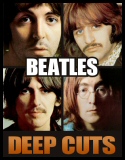Music Home / Entertainment Channel / Bullz-Eye Home
| The Pogues: The Reissues |
Ah, for those who came of age in the 1980s, you either loved the Pogues, hated them, or didn't get them. Singer-songwriter-founder Shane MacGowan and his merry band of Irish folkies put a punk spin on an already lively musical ouevre, taking two stagnating genres and infusing life into both. Add to that MacGowan's far-left political leanings, and American kids coming of age in the Reagan Years got a taste of how the other half lived, some of them hearing those ideals for the first time through MacGowan's gin-soaked, half-in-tune-half-snarled singing.
The Pogues led a charmed life for a while, riding a wave of critical acclaim and signing to the couldn't-do-wrong Stiff Records. Their credibility got a boost in the then-burgeoning college alternative scene when Elvis Costello got involved with producing the band's second album. Bassist Cait O'Riordan, in fact, left the band in 1985 to marry Elvis.
As with many punk bands, the excesses of road life got the best of the Pogues. MacGowan became legendary for what he didn't do – as in, show up for gigs opening for Bob Dylan, and acting erratically when the “Saturday Night Live” spotlight shone on the group in 1988. By 1991, MacGowan could only sing part-time and the band finally kicked 'im out on his arse. Ex-Clashman Joe Strummer filled in for MacGowan after that, along with tin whistle player Spider Stacy, but the band was never the same and broke up for good in 1996. In 2006, Rhino took the band's five prime albums and gave them the reissue treatment, complete with bonus tracks and spruced-up artwork.
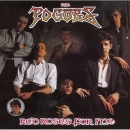 Buy your copy from Amazon.com
Buy your copy from Amazon.com
|
Red Roses for Me
|
When the Pogues exploded onto the UK music scene with this, their 1984 debut, jaws dropped…particularly those belonging to fans of traditional Irish folk. It wasn’t that the music wasn’t traditional; it was certainly full of tin whistles and banjos. No, the thing that caused the old guard to thrust their palms over their ears was lead singer Shane MacGowan, who presented a range that stretched from a drunken slur (“The Auld Triangle”) to a vocal chord shredding scream (“Waxie’s Dargle”), with very little else in-between. Still, even in these early days, MacGowan knew how to write a song; lead track “Transmetropolitan” remains virtually perfect, as do “Sea Shanty” and the all-too-autobiographical “Streams of Whiskey,” where he sings, “When the world is too dark / And I need the light inside of me / I'll walk into a bar / And drink fifteen pints of beer.” (Probably a sub-par night out for MacGowan, I’d wager.) While the material’s strong – half of it consists of covers of traditional Irish songs, anyway – the production’s nothing to write home about, which probably only served to increase the band’s reputation as a bunch of rough-and-tumble drunkards. Bonus tracks include covers of “And the Band Played Waltzing Matilda” and the awesome “Whiskey You’re The Devil,” as well as Spider Stacy’s first notable composition, an instrumental entitled “Repeal of the Licensing Laws.”
wharris@bullz-eye.com
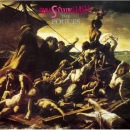 Buy your copy from Amazon.com
Buy your copy from Amazon.com
|
Rum Sodomy & the Lash
|
One of the high points of the Pogues' catalog, Rum Sodomy and the Lash finds the Pogues at once bright and happy, yet despondent at the state of their world. The band captures the bittersweet tradition of Irish folk music in which the beauties of home can't be denied, despite the troubles that abound for its inhabitants. Like the best Pogues records, Rum Sodomy includes droning dirges, such as on the opening strains of "The Sick Bed of Cúchulaínn," a song interspersed with double-time verses punctuated with cursing, power chords, and Spider Stacy's frenetic tin whistle. Slow country cuts such as "Dirty Old Town" and "The Old Main Drag" make a nice change-up to the rowdiness of the more upbeat cuts. Part of the glorious ensemble sound comes from Elvis Costello's production; he'd made a living turning his own angry, sometimes melancholy tunes into beautiful folk twangers in a traditional Nashville style. That formula adapted perfectly to the Pogues' music. One can't avoid tapping feet to trademark upbeat Pogues instrumentals; "The Wild Cats of Kilkenny" offers a manic respite from the lyrically heavy political tunes it separates.
The record concludes with the epic "The Band Played Waltzing Matilda," a ballad clocking in at over eight minutes and exploring one World War I soldier's devastating injuries and how it changed his attitude toward military heroism – and patriotism. While that tale was set some 90 years ago in Australia, and the Pogues record first came out two decades ago, it still rings poignant today, as the American public sees its children, husbands, wives and fathers return from the Middle East battles. MacGowan truly was on top of his game for this record, and it remains a great listen – in this edition freshened up with six bonus tracks.
mojo@bullz-eye.com
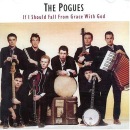 Buy your copy from Amazon.com
Buy your copy from Amazon.com
|
If I Should Fall from Grace with God
|
Drunken fistfights break out among Pogues fans even when they’re not discussing which of the band’s albums is the best of the bunch, so please note that I’m holding a whiskey bottle in one hand as I’m typing with the other that, at least for me, If I Should Fall from Grace with God always wins the battle. Invariably, the song most people remember from the disc is the band’s duet with Kirsty MacColl, “Fairytale of New York,” which has become the soundtrack to every cool kid’s Christmas. The whole album, however, finds the band armed with some of their best songs, then teaming with producer Steve Lillywhite – a.k.a. Kirsty’s then-husband – to clean up their brash Irish folk-punk just enough to bring them mainstream appreciation. The title track reels you into a jig from the second the record begins; “Fiesta” finds the band singing in Spanish, while the horrific bedtime story, “Sit Down by the Fire,” provides arguably the best closing line of the band’s career: “Goodnight and God bless / Now fuck off to bed.” Of the bonus tracks, the one fans will be most grateful for is “The Irish Rover,” a single-only collaboration with the old-school Irish band, the Dubliners; their frontman, Ronnie Drew, said of the song, “I never had to sing anything as fast in my life.” God bless you, Ronnie, but if you can’t keep up with the Pogues, then move out of their way! (Actually, Drew does a fine job; it’s a brilliant track.)
wharris@bullz-eye.com
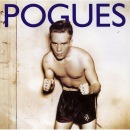 Buy your copy from Amazon.com
Buy your copy from Amazon.com
|
Peace and Love
|
This album gets a bad rap for not being If I Should Fall from Grace with God Again (along with the complaint that it’s too slickly produced this time around, which is silly; the same person did both), but while all the same players were in place, one major ingredient had changed, namely the amount of drugs and alcohol entering Shane MacGowan’s system. That’d probably explain why he has less compositions this time around…and possibly why “White City” and “Cotton Fields” sound pretty damned similar to each other. Still, MacGowan’s loss of brain cells allowed the other members of the Pogues to write more material. The lovely “Lorelei,” a Philip Chevron composition, was a hint of what the MacGowan-less Pogues would sound like a few years later, Terry Woods’ decidedly Celtic “Gartloney Rats” is as good as anything of MacGowan’s, and Jem Finer’s “Tombstone” is appropriately gloomy. The stylistic diversity of the different songwriters pays off for the listener, as long as they’re willing to accept the change of pace. The instant dance party of the title track of the band’s Yeah Yeah Yeah Yeah Yeah EP has been tacked onto the album, along with the cover of “Honky Tonk Women” which features Spider Stacy’s I’ve-just-gargled-with-shards-of-glass vocals. (Strangely, however, the other two songs from that EP – “Jack’s Heroes” and a cover of “Whiskey in the Jar” – ended up on the Hell’s Ditch reissue.)
wharris@bullz-eye.com
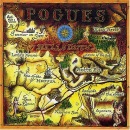 Buy your copy from Amazon.com
Buy your copy from Amazon.com
|
Hell's Ditch
Released: 1990 |
This record was made after the Pogues' heyday had passed. Lead singer Shane MacGowan sings on some of the cuts, but he was on his way out. He'd always had a hard time holding a tune, but he'd at least held his job. It's a shame, as the production was slick, accessible, and the musicians had matured and meshed – taking the music to perhaps its highest standards of performance to date. But that didn't matter, because like a lot of the characters the Pogues had brought to life in their songs, the band had grown weary of heart. The album, recorded amid constant chaos and MacGowan's acid trips, stretches the group's sound to include Asian and Latin sounds. With the influence of producer Joe Strummer, the Pogues broke free of their Irish moorings to create a beautiful world-music mélange of sounds – accomplished a nice little artistic feat before the band hit the rocks and fired MacGowan.
Still, there are some all-time Pogues gems here: Leadoff track and popular radio cut "The Sunny Side of the Street" finds the Pogues, with MacGowan singing lead, in the cheeriest, upbeat mood it had been in years. Follow that up with "Sayanora," a darling little ditty about a U.S. soldier and a Thai hooker. There are other interesting high points on the record en route to the seven bonus tracks on this reissue that include renditions of "Whiskey in the Jar" and yet another "Rainy Night in Soho." It deserves a part in any Pogues devotee's collection, but keep in mind this record's no If I Should Fall from Grace with God.
mojo@bullz-eye.com






